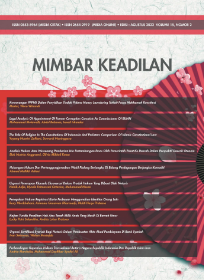Kewenangan PPPNS dalam Penyidikan Tindak Pidana Money Laundering Terkait Pasca Mahkamah Konstitusi
DOI:
https://doi.org/10.30996/mk.v15i2.6332Keywords:
Authority, Civil Servant Investigator, Money LaunderingAbstract
The Crime of Money Laundering (TPPU) is one of the criminal acts that is relatively new and interesting to review. Discussing money laundering offenses means having to discuss predicate crimes. The Crime of Money Laundering (TPPU) or better known as money laundering is a further criminal act or layering crime. The predicate offense is referred to in Article 2 paragraph (1) of Law Number 8 of 2010 concerning the Prevention and Eradication of the Crime of Money Laundering (PPTPPU). In the explanation of Article 74 of the PPTPPU Law as conditional constitutional, the explanation interprets the phrase "investigator of predicate crimes", must be interpreted as "an official or agency that is authorized by laws and regulations to carry out investigations". There are six institutions that have the authority to investigate money laundering offenses, namely the Indonesian National Police, the Attorney General's Office, the Corruption Eradication Commission (KPK), the National Narcotics Agency (BNN), the Directorate General of Taxes and the Customs and Excise Directorate of the Ministry of Finance. Thus, not all "predicate crime investigators" can conduct ML investigations. The only authorized civil servants as investigators of money laundering offenses are Civil Servant Investigators (PPNS) for Taxes and Customs and Excise Civil Service Investigators. This is the official interpretation given by the legislator himself, which is contained in the explanation section of Article 74 of the PPTPPU Law. This raises problems for the The Crime of Money Laundering (TPPU) law enforcement process because it must be handed over to other law enforcers who are authorized to conduct The Crime of Money Laundering (TPPU) investigations or delegated to police investigators for separate investigations (splitsing). However, the controversy over the interpretation of Article 74 of the Money Laundering Law was resolved by the Constitutional Court Decision Number 15/PUU-XIX/2021, which expanded the meaning of 'predicate criminal investigator' in the provisions of Article 74 of PPTPPU Law. So, all PPNS who have investigated the 'predicate crime' given by law are authorized to conduct TTPU investigations. This study uses a normative juridical method, which examines using an approach based on legislation, theories and legal concepts. Simultaneous investigations between the investigation of predicate crimes and money laundering are in line with the principles of case handling, namely simple, fast and low cost. By being given the authority to investigate TTPU to “predicate crime investigators”, it is hoped that case handling and law enforcement of TTPU can run quickly, simply, more optimally and effectively.
Downloads
Downloads
Published
Issue
Section
License
Authors who publish with Mimbar Keadilan agree to the following terms:
- Authors transfer the copyright and grant the journal right of first publication with the work simultaneously licensed under a Creative Commons Attribution-ShareAlike 4.0 International License.. that allows others to share the work with an acknowledgement of the work's authorship and initial publication in this journal.
- Authors are able to enter into separate, additional contractual arrangements for the non-exclusive distribution of the journal's published version of the work (e.g., post it to an institutional repository or publish it in a book), with an acknowledgement of its initial publication in this journal.
- Authors are permitted and encouraged to post their work online (e.g., in institutional repositories or on their website) prior to and during the submission process, as it can lead to productive exchanges, as well as earlier and greater citation of published work (See The Effect of Open Access)














